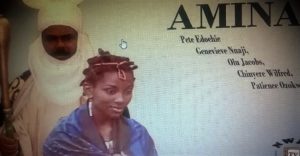An Okija Amaka Production present, Peter Edochie (Emir ), Olu Jacobs (Igwe), Genevivie Nnaji (Nikiru), Chinyere Wilfred ( Adanma ), Patience Ozokuor (Oriuwa ), Kasimu Yaro (Waziri), Yakubu Lamai (Musa), Sani Mu’azu (Sadiq), Azuka Chukwurah (Nkechi). Story, Larry Cold Sweat; Screenplay, Bond Emeruwa, Yakubu Lamai, Emmanuel France; Director of Photography, Mohammed Abdullahi, Ohis Izebe; Director, Ndubuisi Okoh; Producer, Hyacinth Onwuka. C 2008
Bond Emeruwa, Yakubu Lamai, and Emmanuel France Amina evokes legendary Northern Nigerian stories like Cyprian Ekwensie’s first African pulp fiction, Passport of Mallam Ellia, and the Hausa warrior Queen Amina of Zaria. The chronology of the history of Amina in review dates closer to the legendary Amina of Zaria. History of Amina the warrior Queen dates back five hundred years ago. Amina under review is a story taking place with the advent of white man, or around the time of Lord Frederick Lugard in Northern Nigeria.
 Amina is a historical epic drama of two kingdoms, one in the East and one in the North, which path cross and merge mysteriously. Here, no garrison of warriors in lappas, and loin-clothes, with feathered headbands swinging cutlasses behind their Igwe, against the Northern warlike Emir and his horse soldiers, with daggers and spears, yelling allaho akbar at the enemy.
Amina is a historical epic drama of two kingdoms, one in the East and one in the North, which path cross and merge mysteriously. Here, no garrison of warriors in lappas, and loin-clothes, with feathered headbands swinging cutlasses behind their Igwe, against the Northern warlike Emir and his horse soldiers, with daggers and spears, yelling allaho akbar at the enemy.
The Igwe (Olu Jacobs) of Izorguogu village daughter, Nkechi (Azuka Chukuwura ) is caught in the market with two bead necklaces , which one of her mother’s mate Oriuwa (Patience Ozukuor), out of hatred and jealousy, hid in her basket. As a punishment for stealing, and to obey the law of the land, her father, the King, sent her to be executed in the evil forest. She’s able to fight the two guards and runs to the Hausa kingdom in the North, with help from a goat herder, who in turn leaves her with a Muslim Hausa family, who changes her name to Amina.
In the North, Amina’s healing hands saved the Emir by fixing him a concoction that helped him avoid death from the poison given to him by Waziri and a group of conspirators. Her grandmother taught her herbal medicine to cure ailments. The Emir marries her even as the court is not willing for their Emir to marry a pagan tribe from the East. Marrying an Easterner, and therefore a pagan tribe will impure the sanctity of the Islamic and Hausa tradition of the North. He did anyway and gets a child named Musa.
Back in the East, in the Izorguogu kingdom and village, Igwe has now had two boys and a little girl, Nikiru (Genevive Nnaji). The two boys and their mothers are fighting for the attention and love from Igwe, but the last girl child has the attention of a white colonial medical practitioner, as a nursing assistant. Igwe let Nikiru go with the white man to the North to help innoculate the natives, while the two older brothers are left behind jostling for the throne in case the father dies.
So far, there is a political wind of change in the Izoguogu village and the Northern Emirate. Both tragic. Igwe is poisoned by Oriuwa, so her son can inherit the throne. In the North, Sadiq, the prodigal son of the Emir, under pressure from Waziri, assassinates his father only in turn to be poisoned by Waziri, who by rote, inherits the throne. Temporarily of course.
Dear reader you figure out for yourself the rest of the story. One thing in watching this film that would frustrate the average viewer is the lighting. The production and the photographers use less lighting in the film to a certain point in the story. The cinematic device they used was to present an epic, a period story, dating back two hundred years ago. Functions of light in films can be used to create mood and dramatic effects and it could be harsh, subtle or low-key. We sense a brighter light only after the assassination of the Emir in the North and the poisoning of Igwe in the south, indications of ushering in an epoch in each Kingdoms.
Whereas the Warrior Queen of Zaria shed blood in amassing the greatest empire in the region, Amina in the review does so by marriage with not a single drop of blood. Amina is an allegorical tale of Nigeria, when in 2099, Muslims and Christians can comfortably marry and join each other in celebrating Christmas and Ramadan as done so with ease and fanfare in Sierra Leone and Ghana. However, our Amina is a false epic, write a comment and ask me why.
